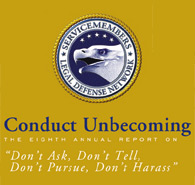A total of 1,250 service members left the US military last year after declaring themselves gay in what amounted to the largest exodus of gay service members since 1987, according to the Servicemembers Legal Defense Network.

The advocacy group for gays in the military said in a report citing Pentagon statistics that the number of military discharges of gays has risen to its highest level in since 1987, and reported incidents of anti-gay harassment have climbed by 23 percent, from 871 in 2000 to 1,075 last year.
Under the "don't ask, don't tell" policy, commanders are prohibited from asking service members about their sexual orientation or pursuing investigations absent evidence of homosexual conduct or a service member's acknowledgment. The policy was expanded in 2000 to prohibit harassment of service members suspected of being gay.
The Army led all branches in discharges with 616, up from 573 the previous year. Of those, 222 came from Fort Campbell, Kentucky. It was the second consecutive year in which that base had more discharges than any other facility.
It was also at that base in 1999 that Pfc. Barry Winchell, 21, was bludgeoned to death by a fellow Fort Campbell soldier who believed Winchell was gay.
C. Dixon Osburn, the group's executive director highlighted that there is a strong correlation between increases in gay discharges and increased harassment.
"The fact that this is the highest number of discharges since 1987 says something to us," Osburn said. "There are reasons for that, and one of the reasons for that is harassment."
The report also finds that the armed forces, throughout every branch, have virtually ignored a July 2000 Pentagon "Anti-Harassment Action Plan."
The plan, adopted by then-Secretary of Defense William Cohen, called for annual, rank appropriate training for all personnel, among twelve other recommendations aimed specifically at curbing harassment. The Action Plan was developed in response to the murder of PFC Barry Winchell.
The Bush Administration, the report says, has failed to implement the Action Plan, giving implicit approval for the continued harassment of lesbian, gay and bisexual service personnel.
"It is nothing short of scandalous," Osburn said, "that the leaders of our country, through their blatant inaction, have demonstrated such callous disregard for our service members."
Calling the statistics "an affront to liberty, unity and military readiness," Osburn added, "as lesbian, gay and bisexual service members are fighting to protect our country from terrorism, they should not be denied their freedom at home. Congress should repeal ?Don't Ask, Don't Tell.?"
Copies of the report are available for download from SLDN's web site, at www.sldn.org.
